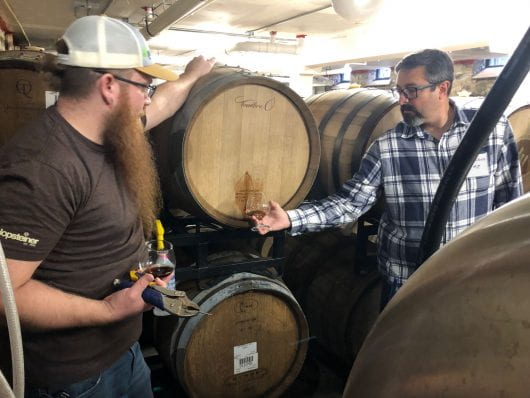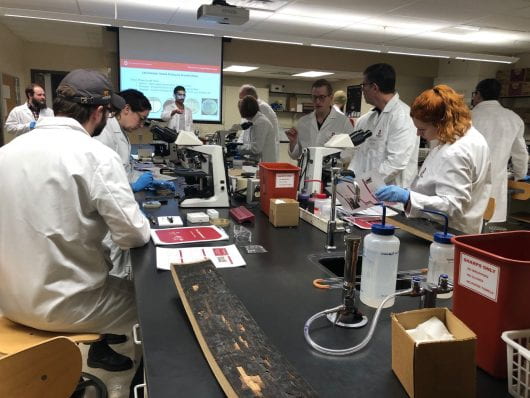
Local brewers attend Wolf’s Ridge Brewing’s Dec. 13 Sour Symposium II workshop in collaboration with the Department of Microbiology. Credit: Courtesy of Cathy Scott
Sometimes relationships turn sour, but that’s exactly the goal for the collaboration between the microbiology department and a local brewery.
The Department of Microbiology has teamed up with Wolf’s Ridge Brewing to bring brewing science workshops to the general public, beginning with Sour Symposium II in December 2019. The partners have big plans for the future of the collaboration, both in and out of the classroom, representing a larger effort by the department to connect with local industry to flesh out a proposed Center for Applied Microbiology on campus.
The inaugural workshop taught attendees about the processes and microorganisms that lead to sour beer. The first segment of the workshop was held at the microbiology labs at the university, and the second half — including tastings — took place at Wolf’s Ridge Brewing’s facilities, according to the event page.
Cathy Scott, director of education and quality for Wolf’s Ridge Brewing, said the event drew primarily homebrewers, with a few professionals. She said the brewery has seen a similarly mixed crowd at past workshops, such as the first Sour Symposium.
“Ohio has produced a lot of really good beers over the past 10 or so years, so we’re really getting ourselves known on the national level in terms of quality and consistency,” Scott said.
Jeff Jahnes, laboratory supervisor for the microbiology department and director of the Center for Applied Microbiology, said this is just the beginning of the center’s efforts to bring the science of brewing to Columbus, Ohio, residents.
“Through our partnership in general, Wolf’s Ridge Brewing has really helped us out, because they have such a great network and helped us connect more broadly with the brewing industry,” he said.

Local brewers attend Wolf’s Ridge Brewing’s Dec. 13 Sour Symposium II workshop in collaboration with the Department of Microbiology. Credit: Courtesy of Cathy Scott
Jahnes said partnering with breweries was a natural first step when the search began for industry ties for the Center for Applied Microbiology. The program is still in its infancy, and Jahnes said its development will depend on the community’s needs, but brewing education is a clear extension of the university’s land-grant mission.
Jahnes said the department would love to have a fermentation science program, and a course has already been proposed for fall 2020.
Scott said Ohio has seen an explosion of craft and home brewing in the past decade, and she attributes it to the growing market for local beer, industry development and a love for the precise process of brewing.
“Brewing is an interesting process. There’s a lot of science behind it. You can read a recipe, and you can — kind of the same way a chef would do — you can read a recipe, and you can translate that into a dish, but you also put your own touch on it,” Scott said. “So I think that unique creativity in addition to the science aspect of brewing really tends to interest people.”
One highly customizable aspect of brewing is the microbes involved in the process. Jahnes said the interactions of bacteria and yeast contribute to the flavor profile of sour beers in particular. While brewers can order specific strains online from laboratories, others choose to ferment their beer in open air and let wild yeast do its work.
Going forward, Jahnes said he hopes to build relationships with other breweries and get input on potential courses. He said he would like experts from Wolf’s Ridge Brewing to guest-lecture as well.
Beyond brewing, there are many other industries the center is poised to collaborate with, such as medicine, pharmaceuticals, food and beverage, environmental technology, sewer water treatment and biotechnology, Jahnes said. Scott added that there is even more potential for microbiological study in the brewing process through grain management.
Of the industry connections the microbiology department is seeking to strengthen, however, none prove as tasty and tart as its ongoing connection to Wolf’s Ridge Brewing. More classes like Sour Symposium II are in the works for the future, and Scott said she hopes they can cover the wide range of beers science has to offer.


